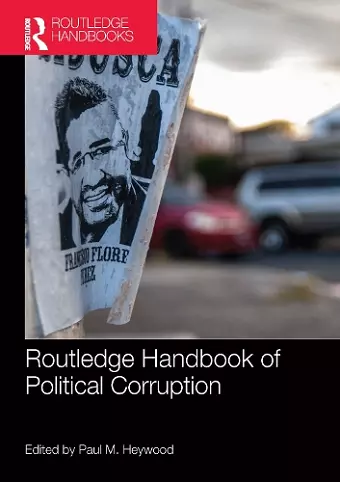Routledge Handbook of Political Corruption
Format:Paperback
Publisher:Taylor & Francis Ltd
Published:13th Mar '18
Currently unavailable, and unfortunately no date known when it will be back
This paperback is available in another edition too:
- Hardback£220.00(9780415617789)

Since the early 1990s, a series of major scandals in both the financial and most especially the political world has resulted in close attention being paid to the issue of corruption and its links to political legitimacy and stability. Indeed, in many countries – in both the developed as well as the developing world – corruption seems to have become almost an obsession. Concern about corruption has become a powerful policy narrative: the explanation of last resort for a whole range of failures and disappointments in the fields of politics, economics and culture. In the more established democracies, worries about corruption have become enmeshed in a wider debate about trust in the political class. Corruption remains as widespread today, possibly even more so, as it was when concerted international attention started being devoted to the issue following the end of the Cold War.
This Handbook provides a showcase of the most innovative and exciting research being conducted in Europe and North America in the field of political corruption, as well as providing a new point of reference for all who are interested in the topic. The Handbook is structured around four core themes in the study of corruption in the contemporary world: understanding and defining the nature of corruption; identifying its causes; measuring its extent; and analysing its consequences. Each of these themes is addressed from various perspectives in the first four sections of the Handbook, whilst the fifth section explores new directions that are emerging in corruption research. The contributors are experts in their field, working across a range of different social-science perspectives.
This is a well-constructed, thought-provoking, and complete overview of and engagement with the corruption field, something that Routledge handbooks are deservedly recognized for. While some of the contributions can be quite dense and challenging, corruption as a field of study is more oriented to advanced undergraduates and graduate students. Thus, the selections are appropriate and likely to maintain relevance for the long term. The book also takes some novel approaches that pay off in terms of conceptual organization: it does not use the standard division of "definitions" and "cases," but evolves beyond that to include the vastly undervalued but direly needed "measurements" and "consequences." By fluidly and compellingly fusing case studies into these broader rubrics, the overall impact of the volume increases for students and researchers alike. Finally, the concluding section, "New Directions," takes on some fairly innovative studies of corruption that could become a leading edge for future research within the discipline. Consequently, students of corruption get the foundation and the future in this one handy volume. A welcome addition.
--M. D. Crosston, Bellevue University
Summing Up: Highly recommended. Upper-division undergraduates and above.
ISBN: 9781138594890
Dimensions: unknown
Weight: 700g
380 pages